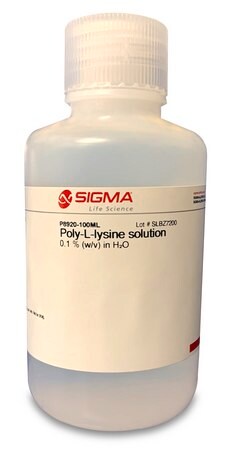Sigma-Aldrich Poly-L-lysine solution, 0.1 % (w/v) in H2O
Catalog No :
CAS Number :
Brand :
In Stock
Specifications:
| Application | Histology, Hematology | ||
| Storage Temperature | Ambient | ||
| Product Type | Laboratory Chemical | Forms | Liquid |
| Product Brand | Sigma-Aldrich | ||
| Product Grade | Laboratory grade | ||
Sigma-Aldrich Poly-L-lysine Solution is a ready-to-use, 0.1% (w/v) aqueous solution of high molecular weight poly-L-lysine (150,000–300,000 Da), widely used as a nonspecific cell attachment factor to enhance electrostatic interaction between negatively charged cell membranes and culture surfaces.
By increasing the number of positively charged sites on a substrate, poly-L-lysine promotes cell adhesion to solid substrates, making it indispensable in cell culture, histology, immunohistochemistry, and microarray preparation.
Key Features
- High Molecular Weight (150,000–300,000) – Provides more cell-binding sites per molecule.
- Ready-to-Use Solution – 0.1% (w/v) in water for direct application.
- Promotes Cell Adhesion – Enhances attachment of a wide range of cell types.
- Versatile Laboratory Applications – Suitable for histology, hematology, immunohistochemistry, microarrays, and microencapsulation.
- Stable Coating – Coated slides are stable for up to one year if stored dust-free at room temperature.
Applications
- Cell Adhesion – Facilitates attachment of cells to glass, plastic, and membrane substrates.
- Histology & Immunohistochemistry – Coating slides for section mounting and staining protocols.
- Tissue Section Preparation – Improves adherence of delicate samples for microscopy.
- Microarray Preparation – Enhances immobilization of biological samples on glass slides.
- Microencapsulation – Used in islet encapsulation and other cell microencapsulation technologies.
- Drug Delivery Research – Conjugation to methotrexate for improved transport efficiency.
Biochemical / Physiological Actions
Poly-L-lysine is a positively charged amino acid polymer that increases the density of positively charged sites available for cell binding. When absorbed onto culture surfaces, it promotes stronger electrostatic interactions with cell membranes, improving adhesion and growth.
For cell types that digest poly-L-lysine, poly-D-lysine is recommended as an alternative.
Preparation & Coating Protocol
- Coat slides or culture surfaces with poly-L-lysine solution.
- Incubate for 5 minutes.
- Allow slides to dry at room temperature.
- Store coated slides dust-free; stable for up to 1 year.
Technical Specifications
| Property | Value |
|---|---|
| Concentration | 0.1% (w/v) in H₂O |
| Molecular Weight | 150,000–300,000 |
| Appearance | Colourless liquid |
| Storage Temperature | Room temperature |
| Applications | Hematology, histology, immunohistochemistry |
| Biological Source | Synthetic |
| Form | Liquid solution |
Sigma-Aldrich Poly-L-lysine Solution, 0.1% (w/v) in H₂O offers a reliable, high-purity substrate treatment for enhancing cell adhesion in microscopy, histology, and cell culture workflows. Its high molecular weight ensures optimal binding site availability, making it a trusted choice for research laboratories in cell biology, pathology, and bioengineering.
- Pack Size: 100 mL 500 mL




 0
0
